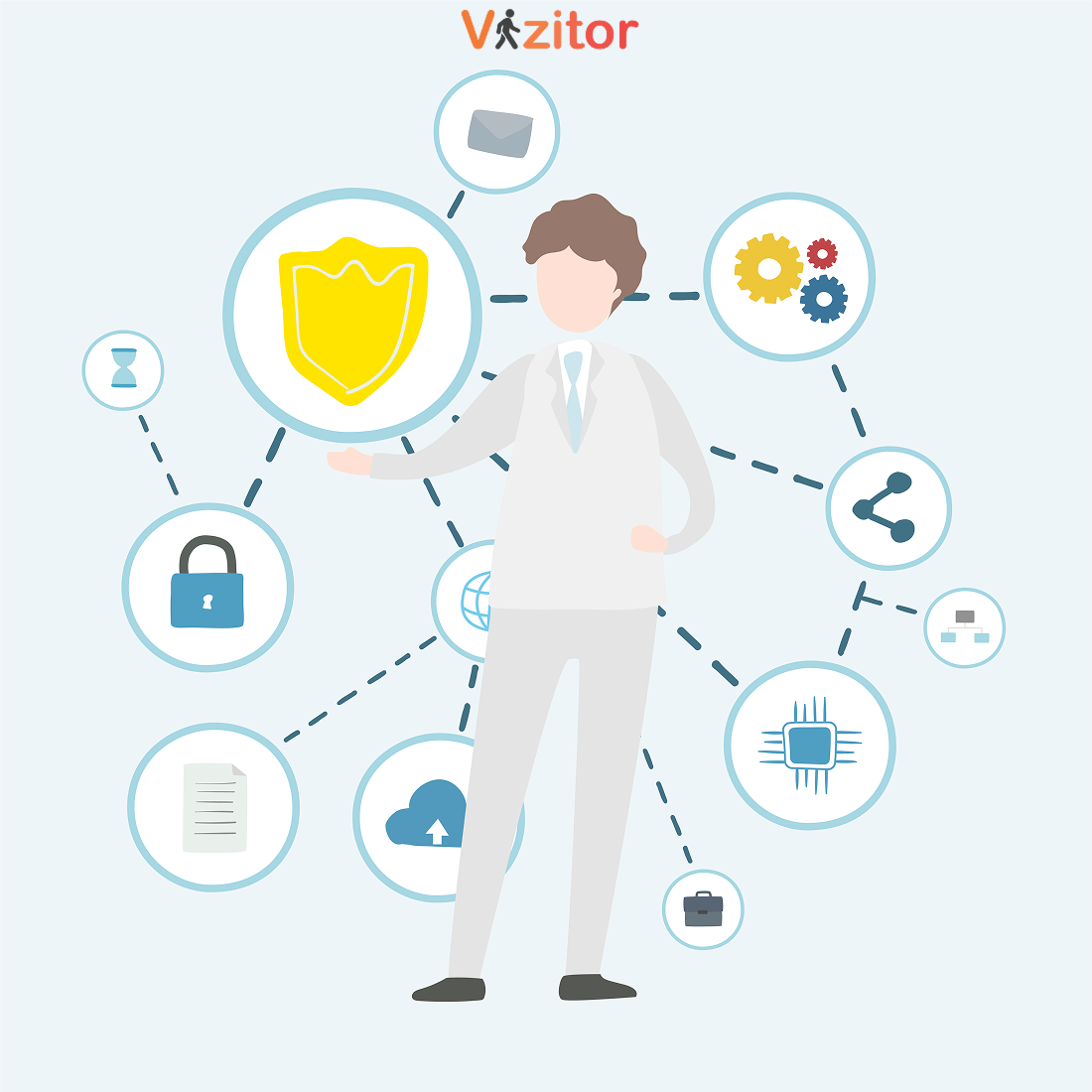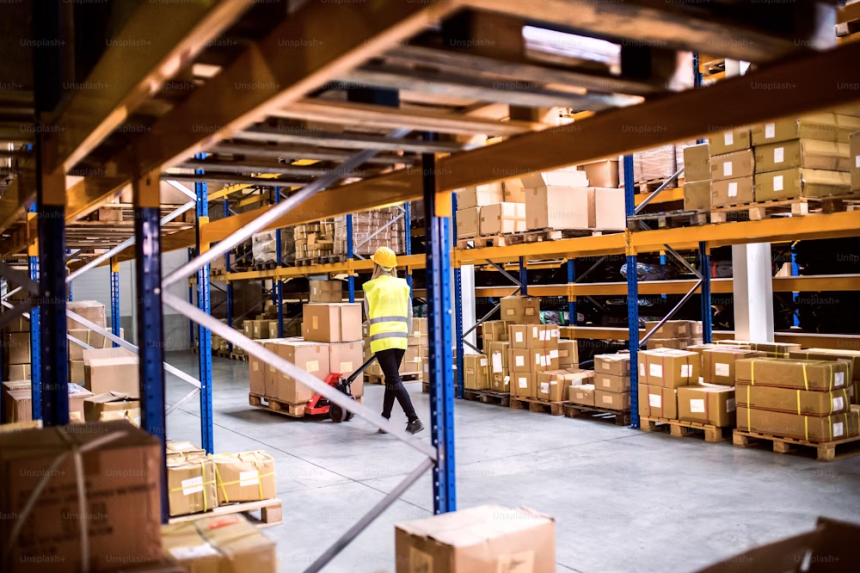Table of Content
Try Vizitor for Free!

Mon, Feb 17, 2025
Read in 8 minutes
In the ever-evolving world of pharmaceuticals and biotechnology, ensuring the safety and security of facilities is of paramount importance.
Not only do these industries deal with valuable intellectual property and sensitive materials, but the risks of theft and regulatory violations require robust and adaptable security measures.
With the continuous advancements in medical research and the valuable nature of intellectual property, these facilities are prime targets for both cyber and physical threats.
Implementing strong security protocols is essential to ensure the safety of sensitive materials, protect against intellectual theft, and maintain compliance with regulatory standards.
A single security negligence can compromise proprietary information and many years of innovation. Traditional security measures, such as staffing every entrance with guards, are no longer sufficient. Modern threats require modern solutions.
This post highlights proven strategies to enhance the security of your pharma or biotech facility, with insights from real-world examples and the importance of workplace management and compliance policies for both physical and digital security.
1. Streamline Visitor Management Policies for enhanced Security
Pharma and biotech companies often host visitors such as contractors, consultants, and regulatory auditors who need to access various sections of the facility. Managing these visitors effectively is crucial to preventing unauthorized access.
Unauthorized access by visitors or third-party vendors can pose a significant threat, especially when sensitive intellectual property or materials are at stake.
A clear and enforced visitor policy is essential to ensure that visitors are only allowed in designated areas. This policy should be tailored to meet the unique security requirements of pharma and biotech facilities, which may include stricter background checks for contractors and vendors.
A well-structured visitor policy should include:
- Purpose of the Policy: Clearly define the objectives of restricting and monitoring visitor access.
- Authorization Protocols: Specify who is permitted to invite guests and under what circumstances.
- Access Restrictions: Determine which areas are off-limits to visitors, such as research labs and manufacturing units.
- Emergency Procedures: Outline steps for visitors during emergencies to ensure their safety and compliance.
According to a 2019 report by GlobalData, 40% of pharmaceutical companies reported security breaches due to inadequate visitor control systems, highlighting the need for advanced visitor management tools.
A modern visitor management system (VMS) like Vizitor ensures that all visitors are properly logged and monitored throughout their time on-site as it offers numerous features such as :
-
Pre-registration and Self-Check-In: Visitors can register in advance, streamlining the check-in process and reducing wait times.
-
Integration with Security Systems: Seamless integration with existing security infrastructure, such as access control and CCTV, enhances overall security posture.
-
Real-Time Tracking: Continuous monitoring of visitor movements within the facility ensures immediate detection of unauthorized access.
Also explore:
2. Implement Strong Access Control Systems for Sensitive Areas
In the pharma and biotech sectors, where intellectual property is a high-value asset, limiting access to sensitive areas is a critical component of any comprehensive security strategy.
Sensitive research, production, and data storage areas in pharmaceutical and biotech facilities require high levels of security. Unauthorized access to these areas can lead to significant risks, including intellectual property theft and contamination of sensitive data.
By integrating advanced access control systems (ACS), companies can ensure that only authorized personnel have access to restricted areas.
These systems, which often use biometrics (fingerprint or facial recognition), RFID badges, or smart cards, help enforce strict access policies. Additionally, the systems can be integrated with surveillance systems to provide real-time monitoring, making it easier to detect any potential threats early.
A 2021 study by Pharmaceutical Security Systems found that 35% of companies that implemented biometric and RFID-based access control systems experienced a 50% decrease in security incidents related to unauthorized access.
3. Adopt Advanced Surveillance and Real-Time Monitoring Systems
In today’s digital pharmaceutical and biotech sectors, maintaining a secure environment is critical to protect sensitive data, intellectual property, and employee safety.
Advanced surveillance and real-time monitoring systems play a pivotal role in achieving this level of security.
These systems go beyond traditional CCTV cameras and provide proactive, automated threat detection, enabling immediate responses to potential risks.
By incorporating AI-powered surveillance and IoT-enabled monitoring devices, pharmaceutical and biotech companies can track movement, monitor unusual activities, and even detect equipment malfunctions or safety violations in real time.
For example, AI can identify unauthorized access or behavior anomalies and instantly alert security personnel, reducing the time it takes to respond to potential security breaches.
In addition, real-time monitoring allows facility managers to oversee critical operations remotely, ensuring continuous protection of research labs, manufacturing units, and high-security areas.
These systems also integrate with other security tools, such as access control and alarm systems, to provide a holistic security approach.
4. Implement a Security-Conscious Culture Through Employee Training and Awareness
One of the most effective ways to enhance workplace security in pharmaceutical and biotech facilities is through comprehensive employee training and awareness programs.
Security isn’t just the responsibility of the IT department or security personnel—it’s something every employee must actively participate in to ensure the facility remains protected from internal and external threats.
A well-trained workforce can act as a first line of defense against security breaches.
Establishing a training program that covers security protocols and best practices is essential. This program should go beyond basic visitor policies and focus on a wide range of topics, such as:
Proper employee sign-in and entrance procedures: Ensuring employees follow correct sign-in protocols reduces the risk of unauthorized individuals entering secure areas.
Recognizing and reporting suspicious activities: Training employees to identify and report unusual behavior can prevent potential security risks before they escalate.
Proper handling of sensitive information: This includes securely storing and sharing research data and intellectual property.
Password security: Emphasizing the importance of strong passwords and multi-factor authentication helps protect digital assets.
Emergency response procedures: Preparing employees for potential emergencies such as fires, security threats, or natural disasters.
Compliance with regulatory requirements: Understanding industry-specific standards, such as FDA regulations or GMP, ensures adherence to required security measures.
By hosting regular training sessions, at least once every quarter, you’ll create a security-conscious culture within your organization. This will help employees stay vigilant, reduce the risk of human error, and ensure everyone is aligned with your security goals.
5. Workplace Security and Compliance Programs: Mitigate Security Risks and Ensure Safety
According to a 2020 report from the Global Health Security Index, 22% of pharmaceutical companies admitted to non-compliance with key workplace safety regulations, leading to security gaps and vulnerabilities.
Ignoring pharma security and compliance can leads to :
- Employees and contractors unaware of proper workplace security and safety protocols.
- Non-compliance with industry regulations, leading to fines and reputational damage.
- Increasing risk of insider threats or accidents due to lack of training and safety culture.
What could be the Solution:
A robust workplace security compliance program ensures that employees and contractors are continuously educated on safety protocols, including emergency response plans, data protection policies, and handling of hazardous materials.
Case study:
In a recent case study, a large pharmaceutical company in the UK experienced a significant data breach due to an untrained employee mishandling sensitive information. After implementing mandatory cybersecurity and workplace security training, the company saw a 45% reduction in employee-related security incidents within six months.
6. Regularly Update Security Protocols to Stay Ahead of Threats
Keeping your security policies up to date is essential in the ever-evolving security landscape. Regularly review and update your workplace security protocols to address emerging threats. This includes adjusting visitor policies, updating access control systems, and ensuring compliance with new regulatory standards.
By staying proactive and adaptable, you ensure that your facility remains secure against both physical and cyber threats.
7. Establish a Comprehensive Emergency Response Plan
Every pharmaceutical or biotech facility must have a well-documented emergency response plan in place. This plan should cover a range of incidents, including workplace violence, natural disasters, cyberattacks, and industrial accidents.
Training employees in emergency response protocols ensures quick and efficient action during critical situations, reducing potential harm and ensuring workplace safety and security compliance.
Vizitor: A Key Visitor Management Solution for Workplace Security in Pharma
In the pharmaceutical industry, visitor management plays a critical role in maintaining workplace security. With sensitive data, high-value assets, and restricted areas, managing visitor access efficiently is essential.
Our advanced Visitor Management System (VMS), like Vizitor, can help pharma facilities enhance security and ensure compliance with industry regulations.
Here are the key features of Vizitor tailored for the pharmaceutical and healthcare industries:
Real-time Visitor Tracking: Monitor visitor flow and maintain access logs to ensure compliance and security.
Customizable Access Control: Restrict access to sensitive areas, allowing only authorized visitors based on their purpose.
Photo ID Verification: Ensure that visitors are properly identified through photo ID scans before granting entry.
Visitor Badge Printing: Automatically print customized badges for easy identification and tracking during their visit.
Regulatory Compliance: Ensure compliance with industry standards like GMP, HIPAA, and safety protocols.
Emergency Notifications: Quickly notify security teams about unauthorized access or potential security threats.
Visitor History Reports: Generate detailed logs and reports for auditing and compliance purposes.
Integration with Security Systems: Seamlessly integrates with existing security cameras and access control systems for holistic security management.
These features make Vizitor an essential tool for enhancing workplace security in pharma and healthcare facilities.
Also explore: How Vizitor’s Visitor Management System works
Conclusion: Ensuring a Secure Future in Pharma and Biotech
In the highly regulated and sensitive pharmaceutical and biotech industries, workplace security must be a top priority. From safeguarding intellectual property to ensuring the safety of your staff and visitors, implementing robust security systems is essential for long-term success.
By focusing on visitor management, employee training, cybersecurity, and leveraging innovative solutions like Vizitor, companies can create a secure and compliant environment that fosters productivity and protects valuable assets.
Take Action Today..
Ready to enhance your workplace security? Contact us now to explore how Vizitor can help strengthen your pharma or biotech facility’s security posture and ensure compliance with industry regulations.
Let’s work together to create a safer, more secure environment for your team and visitors.
Get Started with Vizitor Today!







